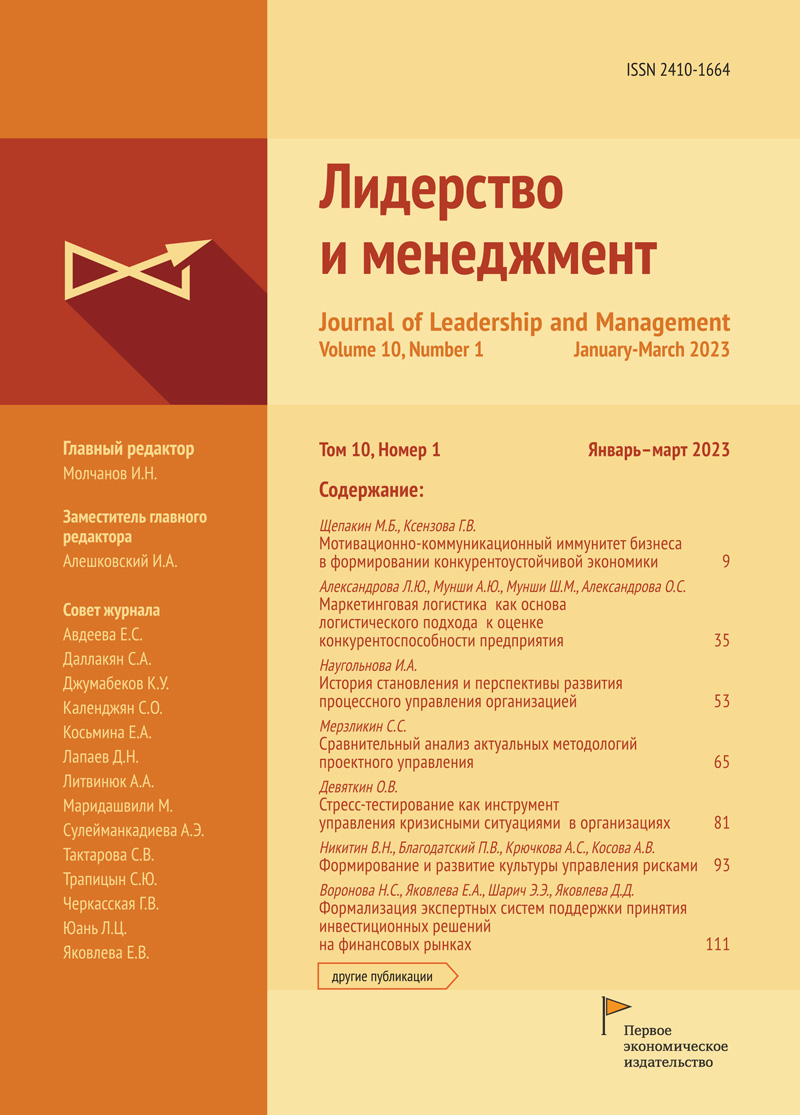Stress and manager's professional performance
- Autores: Litvinyuk A.A.1
-
Afiliações:
- Plekhanov Russian University of Economics
- Edição: Volume 10, Nº 1 (2023)
- Páginas: 297-310
- Seção: Articles
- URL: https://journals.eco-vector.com/2410-1664/article/view/607995
- DOI: https://doi.org/10.18334/lim.10.1.117110
- ID: 607995
Citar
Texto integral
Resumo
The article is devoted to identifying the impact of stressful situations on the managers' performance. The theory of the motivational complex of labor activity was used as the methodological basis of the study.The following methods were used: sociological surveys and standard test methods used in HR management to assess the professional and personal qualities of employees. Managers of Russian organizations retrained at Plekhanov Russian University of Economics were the respondents of the survey. The main objective of the study was to analyze the positive and negative impact of stressful situations in the workplace on the managers' professional activities, the influence of organizational stress factors on the manager's performance and analysis of the psychosomatic effects of stress caused by errors in the manager's motivation system. The conclusions drawn on the basis of the results obtained showed that ignoring stressful situations in the managers' professional activities leads to a decrease in the productivity of their work due to the development of negative emotions and actualization on their basis of five groups of psychosomatic diseases that do not allow managers to fully use their potential to solve the tasks assigned.
Palavras-chave
Sobre autores
Aleksandr Litvinyuk
Plekhanov Russian University of Economics
Email: litvinuk-2000@mail.ru
Bibliografia
- Литвинюк А.А. Организационное поведение. - М.: Юрайт, 2014. – 527 c.
- Каминская Э.А., Волк М.И., Сичкарь Е.В. Роль стрессогенных условий в проявлении лидерского потенциала // Мир науки. Педагогика и психология. – 2019. – № 1. – c. 1–8.
- Кречетников К.Г., Шойнхорова В.Р. Стресс и стресс-менеджмент в деятельности руководителя // Современные тенденции в экономике и управлении: новый взгляд. – 2016. – № 40–2. – c. 22-28.
- Кобозев И.Ю. Оценка профессионального стресса и его влияния на копинг поведения руководителей // Вестник психотерапии. – 2011. – № 37(42). – c. 92-100.
- Selye H. Syndrome produced by diverse nocuous agents // Nature. – 1936. – p. 32. – doi: org/10.1038/138032a0.
- Selye H. A. Thymus and Adrenals in the Response of the Organism to Injuries and Intoxications // British Journal of Experimental Pathology. – 1936. – № 17. – p. 234-248.
- Соловьёв М.Н. Психологическая устойчивость личности как фактор эффективного преодоления профессиональных стрессов // Вестник Московского государственного областного университета. Серия: Психологические науки. – 2019. – № 3. – c. 41–55. – doi: org/10.18384/2310–7235-2019-3-41-55.
- Хачатурова М.Р., Фёдорова А.А. Влияние стрессовых факторов на эффективность прохождения ситуации оценивания сотрудниками с различным уровнем креативности // Социальная психология и общество. – 2018. – № 1. – c. 108–123.
- Москвитин Г.И., Астахова Н.И. Менеджмент. / Учебник. - М.: Юрайт, 2016. – 422 c.
- Копылов Д. Г. Де-юре, де-факто и теневые директора в законодательстве и судебной практике Великобритании и России // Закон. – 2019. – № 4. – c. 196–207.
- Литвинюк А.А., Смирнова М.Е., Ширванов Р.А. О методике прогнозирования организационного поведения персонала организации // Инновации в менеджменте. – 2018. – № 2(16). – c. 42–57.
- Литвинюк А.А., Бабынина Л.С., Журавлев П.В. Управление персоналом. / Учебник. - М.: Юрайт, 2023. – 461 c.
- Lane Richard D. MD, PhD. Neural Substrates of Implicit and Explicit Emotional Processes: A Unifying Framework for Psychosomatic Medicine // Psychosomatic Medicine. – 2008. – № 70(2). – p. 214–231. – doi: 10.1097/psy.0b013e3181647e44.
- Dimoff J. K., Kelloway E. K. With a little help from my boss: The impact of workplace mental health training on leader behaviors and employee resource utilization // Journal of Occupational Health Psychology. – 2019. – № 1. – p. 4.
- Hammer L. B. Effects of a Total Worker Health® leadership intervention on employee well-being and functional impairment // Journal of Occupational Health Psychology. – 2021. – № 6. – p. 582.
- Terkamo‐Moisio A. Towards remote leadership in health care: Lessons learned from an integrative review // Journal of Advanced Nursing. – 2022. – № 3. – p. 595–608.
- Устюгова В.С., Эльмурзаева Р.А. Управление стрессом как основа эмоционального менеджмента // Вестник Томского государственного университета. – 2012. – № 1(17). – c. 74–78.
- Деева О.С. Причины профессионального стресса и методы его профилактики // Учёные записки Тамбовского отделения РосМУ. – 2019. – № 14. – c. 140–146.
- Swaminathan A. Stress resilience is established during development and is regulated by complement factors // Cell Reports. – 2023. – № 1. – p. 111973. – doi: 10.1016/j.celrep.2022.111973.
- Flux M. C., Lowry C. A. Inflammation as a mediator of stress-related psychiatric disorders // Neurobiology. – 2023. – p. 885-911. – doi: 10.1016/B978-0-323-85654-6.00052-6.
Arquivos suplementares









